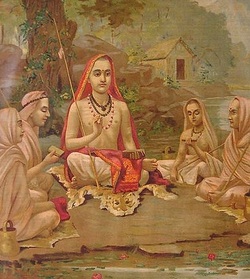"Everyone has faith in God though everyone does not know it. For everyone has faith in himself and that multiplied to the nth degree is God. The sum total of all that lives is God. We may not be God, but we are of God, even as a little drop of water is of the ocean." Mohandas Gandhi.
Theodor Goldstücker, a German Sanskrit scholar, was one of the first to notice the similarities between Spinoza's pantheism and the Vedanta tradition of Hinduism, writing that Spinoza's thought was "... a western system of philosophy which occupies a foremost rank amongst the philosophies of all nations and ages, and which is so exact a representation of the ideas of the Vedanta, that we might have suspected its founder to have borrowed the fundamental principles of his system from the Hindus, did his biography not satisfy us that he was wholly unacquainted with their doctrines... We mean the philosophy of Spinoza, a man whose very life is a picture of that moral purity and intellectual indifference to the transitory charms of this world, which is the constant longing of the true Vedanta philosopher... comparing the fundamental ideas of both we should have no difficulty in proving that, had Spinoza been a Hindu, his system would in all probability mark a last phase of the Vedanta philosophy." Literary Remains of the Late Professor Theodore Goldstucker, W. H. Allen, 1879, p32.
Unknown Author




No comments:
Post a Comment
Note: Only a member of this blog may post a comment.